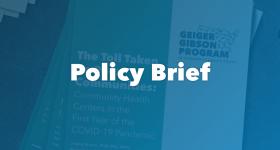30. How the Supreme Court’s Medicaid Decision May Affect Health Centers: An Early Estimate.
Authors Katherine Jett Hayes, Peter Shin, Sara Rosenbaum of the Geiger Gibson/ RCHN CHF Research Collaborative provide a preliminary assessment of the impact on community health centers of states’ refusal to implement the Medicaid expansion under the Affordable Care Act.



